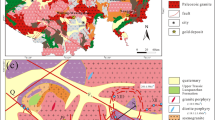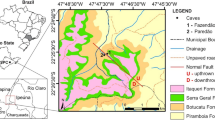Abstract
We report on SAR-OSL dating of closely-spaced samples from the loess-palaeosol sequence near Mostiştea lake (Danube Plain, SE Romania). We used sand-sized quartz and a SAR protocol that involved a preheat of 10s at 220°C and a test dose cutheat to 180°C. It is shown that these thermal pretreatments isolate a quartz OSL signal that is dominated by the fast component. The behaviour of this signal in the SAR protocol is then documented. The ratio of the measured to given dose tends to lie slightly but systematically above unity (∼5% on average) and the recycling ratio below unity (∼6% on average); for all samples, the recuperated signal is negligible. Within analytical uncertainty, the nineteen optical ages are internally consistent and agree with the predictions from a palaeomagnetic age-depth model. Although it may be possible to optimize the SAR measurement procedure, the optical ages already confirm the chronostratigraphic position of the uppermost welldeveloped palaeosol in that it formed during MIS 5. The established chronology allows correlating the sequence near Mostiştea lake with that near Mircea VodĂ that we investigated earlier.
Similar content being viewed by others
References
Adamiec G and Aitken M, 1998. Dose-rate conversion factors: update. Ancient TL 16: 37–50.
Aitken MJ, 1976. Thermoluminescence age evaluation and assessment of error limits: revised system. Archaeometry 18(2): 233–238, DOI 10.1111/j.1475-4754.1976.tb00168.x.
Aitken MJ and Alldred JC, 1972. The assessment of error limits in thermoluminescence dating. Archaeometry 14(2): 257–267, DOI 10.1111/j.1475-4754.1972.tb00068.x.
Balescu S, Lamothe M, Mercier N, Huot S, Balteanu D, Billard A and Hus J, 2003. Luminescence chronology of Pleistocene loess deposits from Romania: testing methods of age correction for anomalous fading in alkali feldspars. Quaternary Science Reviews 22(10–13): 967–973, DOI 10.1016/S0277-3791(03)00056-8.
Balescu S, Lamothe M, Panaiotu C. and Panaiotu C, 2010. La chronologie IRSL des séquences loessiques de l’Est de La Roumanie. Quaternaire, in press.
Ballarini M, Wallinga J, Wintle AG, Bos AJJ, 2007. A modified SAR protocol for optical dating of individual grains from young quartz samples. Radiation Measurements 42(3): 360–369, DOI 10.1016/j.radmeas.2006.12.016.
Bøtter-Jensen L, Andersen CE, Duller GAT and Murray AS, 2003. Developments in radiation, stimulation and observation facilities in luminescence measurements. Radiation Measurements 37(4–5): 535–541, DOI 10.1016/S1350-4487(03)00020-9.
Conea A, 1969. Profils de loess en Roumanie. La stratigraphy des loess d’Europe. In: Fink J, ed., Bulletin de l’Association Française pour l’étude du Quaternaire. Suppl. INQUA: 127–134.
Conea A, 1970. Formaţiuni Cuaternare în Dobrogea (loessuri şipaleosoluri) (Quaternary units in Dobrogea). Editura Academiei RSR, Bucureşti: 234 pp (in Romanian).
Duller GAT, 2003. Distinguishing quartz and feldspar in single grain luminescence measurements. Radiation Measurements 37(2): 161–165, DOI 10.1016/S1350-4487(02)00170-1.
Lang A, Lindauer S, Kuhn R, Wagner GA, 1996. Procedures used for optically and infrared stimulated luminescence dating of sediments in Heidelberg. Ancient TL 14: 7–11.
Mauz B, Bode T, Mainz E, Blanchard H, Hilger W, Dikau R and Zöller L, 2002. The luminescence dating laboratory at the University of Bonn: equipment and dating procedures. Ancient TL 20(2): 53–61.
Mejdahl M, 1979. Thermoluminescence dating: beta dose attenuation in quartz grains. Archaeometry 21(1): 61–72, DOI 10.1111/j.1475-4754.1979.tb00241.x.
Murray AS and Funder S, 2003. Optically stimulated luminescence dating of a Danish Eemian coastal marine deposit: a test of accuracy. Quaternary Science Reviews 22(10–13): 1177–1183, DOI 10.1016/S0277-3791(03)00048-9.
Murray AS and Olley JM, 2002. Precision and accuracy in the optically stimulated luminescence dating of sedimentary quartz: a status review. Geochronometria 21: 1–16.
Murray AS and Wintle AG, 2000. Luminescence dating of quartz using an improved single-aliquot regenerative-dose protocol. Radiation Measurements 32(1): 57–73, DOI 10.1016/S1350-4487(99)00253-X.
Murray AS and Wintle AG, 2003. The single aliquot regenerative dose protocol: potential for improvements in reliability. Radiation Measurements 37(4–5): 377–381, DOI 10.1016/S1350-4487(03)00053-2.
Murray AS, Buylaert JP, Henriksen M, Svendsen JI and Mangerud J, 2008. Testing the reliability of quartz OSL ages beyond the Eemian. Radiation Measurements 43(2–6): 776–780, DOI 10.1016/j.radmeas.2008.01.014.
Necula C and Panaiotu C, 2008. Application of dynamic programming to the dating of a loess-palaesol sequence. Romanian Reports in Physics 60: 157–171.
Panaiotu CG, Panaiotu EC, Grama A and Necula C, 2001. Paleoclimatic record from loess-paleosol profile in Southeastern Romania. Physics and Chemistry of the Earth A 26(11–12): 893–898, DOI 10.1016/S1464-1895 (01)00138-7.
Panaiotu CE, Balescu S, Lamothe M, Panaiotu CG, Necula C and Grama A, 2004. Astronomical and luminescence dating of Lower Danubian loess (Romania). Geophysical Research Abstracts 6: 02900.
Prescott JR and Hutton JT, 1994. Cosmic ray contributions to dose rates for luminescence and ESR dating: large depths and long-term time variations. Radiation Measurements 23(2–3): 497–500, DOI 10.1016/1350-4487(94)90086-8.
Roberts HM, 2008. The development and application of luminescence dating to loess deposits: a perspective on the past, present and future. Boreas 37(4): 483–507, DOI 10.1111/j.1502-3885.2008.00057.x.
Stevens T, Thomas DSG, Armitage SJ, Lunn HR, Lu H, 2007. Reinterpreting climate proxy records from Late Quaternary Chinese loess: A detailed OSL investigation. Earth-Science Reviews 80(1–2): 111–136, DOI 10.1016/j.earscirev.2006.09.001.
Thomsen KJ, Bøtter-Jensen L, Jain M, Denby PM and Murray AS, 2008. Recent instrumental developments for trapped electron dosimetry. Radiation Measurements 43(2–6): 414–421, DOI 10.1016/j.radmeas.2008.01.003.
Timar A, Vandenberghe D, Panaiotu EC, Panaiotu CG, Necula C, Cosma C and Van den haute P, 2010a. Optical dating of Romanian loess using fine-grained quartz. Quaternary Geochronology 5(2–3): 143–148, DOI 10.1016/j.quageo.2009.03.003.
Timar Gabor AI, Vandenberghe DA, Vasiliniuc S, Panaiotu CE, Panaiotu CG, Dimofte D, Dimofte D and Cosma C, 2010b. Optical dating of Romanian loess: a comparison between sand-sized and silt-sized quartz. Quaternary International: accepted for publication.
Vandenberghe D, De Corte F, Buylaert J-P, Kučera J and Van den haute P, 2008. On the internal radioactivity in quartz. Radiation Measurements 41(7–8): 768–773, DOI 10.1016/j.radmeas.2006.06.010.
Wintle AG and Murray AS, 2006. A review of quartz optically stimulated luminescence characteristics and their relevance in singlealiquot regeneration dating protocols. Radiation Measurements 41(4): 369–391, DOI 10.1016/j.radmeas.2005.11.001.
Author information
Authors and Affiliations
Corresponding author
About this article
Cite this article
Vasiliniuc, Ş., Timar-Gabor, A., Vandenberghe, D. et al. A high resolution optical dating study of the Mostiştea loess-palaeosol sequence (SE Romania) using sand-sized quartz. Geochron 38, 34–41 (2011). https://doi.org/10.2478/s13386-011-0007-8
Received:
Accepted:
Published:
Issue Date:
DOI: https://doi.org/10.2478/s13386-011-0007-8




